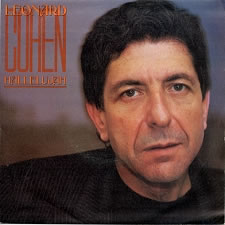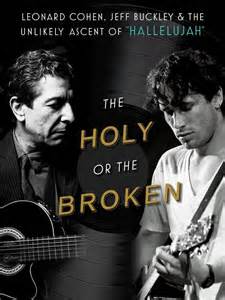The song was not originally released as a single, and garnered almost no airplay. Cohen did perform it in concert over the next few years, though the version he played contained different lyrics from the commercially released version on his album. While many of the cover versions are much smoother, I like the gritty and raw sound of the original. It’s a song about almost everything in life, and life just isn’t always smooth and pretty. It’s also about hope, perseverance and, with faith or maybe with luck, triumph. Here’s Cohen performing the song live, with some of the added verses… The story of this song doesn’t come close to ending there. At some point in the mid to late 1980’s, Bob Dylan began performing the song in concert. From there, the Velvet Underground’s John Cale heard it and wanted to record it. He contacted Cohen, who faxed him fifteen pages of lyrics. Cale picked what he wanted and recorded his own version of the song for a tribute album to Leonard Cohen. His cover version was more piano driven, and is much closer to the version many others would cover than Cohen’s original. In the early 1990’s, Cale also recorded a live version, which would appear on his own album, Fragments Of A Rainy Season. Here’s John Cale, on stage alone with his piano, with his take on “Hallelujah”… This is where I think it gets very interesting. A solo artist named Jeff Buckley was playing clubs in New York City, and he recorded a four-song Live EP called Live At Sin-é, which included a version of “Hallelujah”. This was his first release. He followed it up in 1994, a year later, with his first album, which was called Grace. In addition to original material, he also recorded a version of “Hallelujah”. Again, there was no single. Critics loved him. In fact, about a decade after his first album was released, Rolling Stone would name him as one of the greatest singers of all time. Here’s Jeff’s very powerful version of “Hallelujah”, which is so powerful that many people believed it was his original song! That’s been viewed over forty million times, and Sony only posted it to YouTube a few years ago! Tragically, Jeff Buckley drowned in 1997 and, while there have been some posthumous releases, he never completed his second album. Into the 2000’s, and more versions popped up, started to appear on the charts. Rufus Wainwright and k.d. lang had hits with “Hallelujah” in America, while Epsen Lind took it to number one in Norway.
In 2008, Alexandra Burke sang the song as she competed on the British version of “The X-Factor”. Burke did win that year’s competition, thanks in no small part to her version of “Hallelujah”. Jeff Buckey fans were outraged. Burke’s version of the song was climbing the charts due to her television appearance, and Buckley fans began a campaign to get his song onto the charts and keep Burke from getting to number one. Burke’s version sold well, and set records, and while it went to number one in the U.K., Jeff Buckley’s version was right behind it at number two, giving him his first smash hit, sadly arriving over a decade after he’d passed away. That same year, while Burke and Buckley were at the top of the charts, interest in the original version began to grow, and Leonard Cohen’s original version cracked the top forty. The song’s popularity continued to grow. Kate Voegele performed it on One Tree Hill. Classical vocalists Renee Fleming and Katherine Jenkins each recorded it. American Idol’s Jason Castro also recorded it. And so did German electronic band Tangerine Dream. Bon Jovi had a hit with it in Austria. And Justin Timberlake had a hit with it in the U.S. (and eight other countries).
It’s been used in lots of television shows, including “The West Wing”, “Scrubs”, “The O.C.”, “House”, “Criminal Minds”, “ER”, “Ugly Betty” and “Dancing With The Stars”. And it’s showed up in plenty of movies, too, including “Shrek” and “Watchmen”. “Hallelujah” has been performed by over three hundred artists worldwide. The BBC has filmed a documentary on it (which you might be able to watch online one of these days RIGHT HERE), and there’s even a book that has been written about this one song (which you can find out more about if you click the book cover)! I feel like at this point, there should be some profound revelation. What does it all mean? This song has been recorded and performed by hundreds of artists all over the world.
It has endured and triumphed over incredible odds. The original artist’s record label nearly refused to release it. Buckley died in that in-between time when MTV was fading and iTunes and YouTube were still years away. Plus, even if you don’t try to include all of Cohen’s original 80+ verses, it’s still a pretty long song! Most versions clock in at over seven minutes, and there just aren’t that many popular songs that are that long. Enduring and triumph. Music did that. It helps us get through, even when we feel beaten and worn out by the struggle. It helps us to be grateful for what we have, and it gives us hope for what we can achieve. Whether you prefer that gritty and raw version that Leonard Cohen first recorded, or you like the more popular voices singing a smoother song, it still comes down to the same thing. A global love for music. It unites. It heals. It touches our hearts and our souls. It helps us all muster the strength to whisper, to shout and to sing. Hallelujah.
2 Comments
Lydia Lawrence
8/6/2014 04:15:10 pm
I didn't hear this song until I saw the movie Shrek. I loved it and I love it still. My favorite rendition: https://www.youtube.com/watch?v=Qt2FWAbXinY&index=7&list=FLUDzcXDb8MPXhgYKKqrTBnw
Reply
Ken
8/6/2014 04:42:33 pm
Hi Lydia!
Reply
Leave a Reply. |
AuthorKen Kessler has always been interested in psychic phenomena, and like Mulder on the X-Files, wants to believe. But like most, he tends to look for, and accept, rational explanations. (More) Archives
April 2018
Categories |



 RSS Feed
RSS Feed